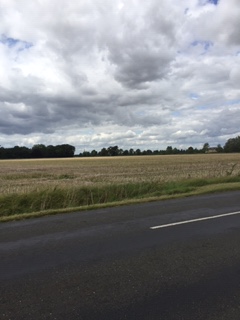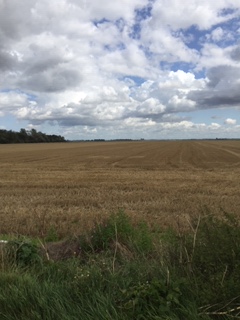On Sunday last I drove to Thorney in Cambridgeshire to find the B1040 road, a road I travelled many times as a child, from my home just outside Thorney to visit relatives in and around Whittlesey. I’m currently working on a poem for the latest Beautiful Dragons anthology Well, Dam…addressing ways human activity has used and abused the planet’s natural water supply. Water is both a life-giver and a destroyer, as was all too apparent recently with the damaged dam at Whaley Bridge. My own poem is about the B1040 and the pollarded willows, planted by the roadside, that used to seem to shake their fists at me as a child. It’s these willows that are central to my poem. There are two stanzas: one describing my childhood memory of riding along the B1040 in my dad’s car; and one describing driving that same road as an adult. I wanted my poem to be authentic, so I decided to drive 150 miles in order to take that road trip. I booked us a table at the Dog in a Doublet, which is about half way along the road, between Thorney and Whittlesey.
We arrived in Thorney at about 1.00 p.m. The A47 to Wisbech and Kings Lynn bypasses the village now. When I was a child it went through the village, past the Rose and Crown pub and past the alms-houses where my favourite teacher, Miss Bacon, used to live. But now you have to come off the A47 at a roundabout to pick up the B1040. It was weird to drive the road I knew so well as a child. I remembered how we used to be taken for ‘nature walks’ along the road-side when I was at primary school in Thorney. And I’d forgotten the two right-angled bends just out of the village. There were no pollarded willows between Thorney and the Dog in a Doublet at all, and I began to worry that my poem was more pipe-dream than memory. But the remembered landscape, ‘stretching forever across flat wetlands’ was real, as these photos show.


We stopped for lunch. My father was born in an upstairs room at the Dog in a Doublet. He weighed a prodigious 14lbs at birth. My mother was always sceptical about this birth story: my dad always thought he was one of the tallest men on the planet, despite only being about 5ft 8ins; so she assumed the birth weight tale was part of this misconception about his real size. But then she met the midwife who delivered him, and who confirmed the story. While I’m having lunch, I’m thinking of my poor Grandma upstairs, pushing out a whole stone of baby. My own boys were 9lbs at birth, and that was labour enough for me!
After lunch we drove on from the D in a D towards Whittlesey; and there were the pollarded willows. In the second stanza of my poem, written as an adult from a childhood memory, those willows still stand tall and threatening in their pollarded state. The truth is, they’ve changed. They’re still ranked alongside the water-way that we called Whittlesey Wash, a man-made drainage dyke that runs alongside the road. But they’ve grown dreadlocks of dangling leafy branches so that you’d hardly know they were pollared at all; some are falling at precarious angles, some have fallen completely and lie by the roadside looking forlorn. The seried ranks of threatening willows of my childhood looked sad, aged, in need of a retirement home. Pylons march across the flat fields, which I don’t remember from childhood, but which were almost certainly there then; and new wind turbines are well placed to capture the wind that blows straight from the Urals across the flat landscape of northern Europe. I got to Whittlesey, negotiated a roundabout and drove all the way back along the B1040 to Thorney. I visited my old primary school, The Duke of Bedford and then drove on to my childhood home along English Drove. The three bungalows, which were new when we moved into one of them when I was nine, are still there; but they look old and tired too. Perhaps all the places of your early memories age, grow ‘old and tired’ in step with your own ageing. I’d seen all I needed to see: it was worth the long drive to see how I need to work some more on my second stanza to reflect changes to that childhood landscape. I drove home to Saddleworth.
On Monday I continued to grapple with the new Sage software to do my daughter’s books at the Black Ladd. It’s all done in the Cloud now, to enable easy access to HMRC for tax purposes. I can access it on my MacBook, which is good: the former software couldn’t work with Apple operating system. But the downside is, my MacBook doesn’t have a number pad, so the number keys are all in a row along the top of the qwerty keyboard. I decided to order a Bluetooth number pad to work with MacBook. It arrived later in the week, a beautiful, slim gismo that is a perfect accessory for my lovely slim computer. But on Monday I was tired from the drive on Sunday; so by the end of the day my concentration was waning. Trying to reconcile the last bank statement, instead of the necessary 0, I kept getting a figure that was £40 out. I checked and double checked, same result. I decided to pack up and go home; I brought the bank statement home, to work on when my brain wasn’t so frazzled. I found my mistake on Thursday: two amounts with the same four digits, in slightly different configuration, so they looked similar. At last, the desired zero!
The rest of the week I’ve been carrying on with the post-PhD spring clean. I tackled Bill’s display cases of Burago classic car models. I waited until he was out of the house, and I didn’t tell him I was going to do them or he would have hung around to make sure I was treating them with the respect he considers they deserve. Of course I did! I dusted every one of them with a very soft cloth, cleaned their shelves, rearranged them in much the same order. By the time he came home they were done. I also removed, dusted, reorganised all the books on the bookshelves lining the landing. What a horrible job. And, being a sensible grown-up woman, I undertook the job in white jeans. Well, they were white when I started; by the time I finished they looked decidedly grey. The books had an accumulation of four PhD years worth of dust. I got rid of some books about the Royal Family: not my books, I come from Major Fairfax country. They belonged to Bill’s late wife; but I asked before I sent them to the charity shop, along with various how-to books on art techniques: How to do watercolour; How to do life drawing—that kind of thing. If I ever need to do those things in future, I’ll do what I always do and fly by the seat of my pants. I disturbed several very large spiders, which can stay as my guests as long as they don’t party all night and keep me awake. But the find of the day was yet another copy of Carol Ann Duffy’s The World’s Wife, which is one of my all-time favourite poetry collections. I have three on my poetry shelves in the study already; and I’ve given away a couple of copies to friends and family members. I also have a signed copy; so maybe I’ll take this one to Stanza on Tuesday and see if any of my members want/need a copy. I think CAD should pay me royalties.
Other events this week: Hilary has booked us for a slot in The Other, a poetry open mic event hosted by Michael D Conley and Eli Regan, both friends from my time at MMU on the MA Creative Writing course. This is a different kind of open mic, in that you swap poems with another poet and read each other’s work to the audience. The event is in Didsbury on Thursday September 5th, the night before my Viva. Hilary said she’s going to get me drunk so I can fetch up at my Viva with a massive hang-over like a real student. It’s a plan; not sure it’s a good one.
Lastly, we have a date and venue for the launch of the second Dragon Spawn pamphlet, Rugged Rocks Ragged Rascals, at the Royal Kings Arms Hotel in Lancaster on September 11th, from 7.00 p.m. Barbara HIckson, one of the three poets in the pamphlet, has asked Hilary and me to read from our own Dragon Spawn pamphlet, Some Mothers Do…, at the launch. I’m holding off sending my introductory biography: I’m hoping this will be the first time I can be introduced as Dr Rachel Davies and I can’t pre-empt that outcome. The event is five days after the Viva, so I should be recovered from my massive student hang-over by then.
I read one of my earlier blog posts this week, about a long week-end on one of Kim Moore’s poetry carousels three years ago. I was recovering from a back injury I’d sustained on my birthday the month before, so it was touch and go whether I could go on the carousel at all. I wrote this poem at Kim’s workshop. It addressed those incidents from our lives that don’t seem to bear any real importance until years later, when we understand the real relevance of them. When I was teaching, people often asked what you need to become a teacher. They were probably thinking GCSE qualifications, areas of expertise etc. But I always used to say ‘you need to remember what it feels like to be a child’. That’s what was paramount for me. If you couldn’t remember the minor put-downs you endured, or the uplifting highs of praise or achievement, you’d be less as a teacher, in my opinion. This incident from my childhood was probably where that notion came from. Poor Barry. I’ve never forgotten how this must have felt.
Teacher in Training
I did my growing up in that room.
We were ranked by our last exam results,
sat from desk one, row one left for top scorer
to desk six, row five right for bottom of the class.
My space was always desk two or three, row one
left; the last seats right reserved for Barry Button
and Billy Dart. Mr Peel would sit at his desk on a dais,
eyes front, trying but mostly failing to be frightening.
There was the poster of God that hung on the wall;
the birds that follow the plough, the dry leaves,
snail shells, pierced conkers on the nature table.
We never questioned this order of things,
it was what it was and my place was secure
in the social order until that day Barry Button
couldn’t say the word the, the digraph th usurped
by the phoneme v. I felt his humiliation as a worm
eating me from the inside, but Mr Peel kept trying
and failing to get Barry to say the, a public torture
that we held our breaths to watch. Some of us laughed
from amusement or nerves or embarrassment or
if it wasn’t Barry it would be me. I didn’t know then
that this would be my yardstick for how not to teach.
Rachel Davies
August 2016

